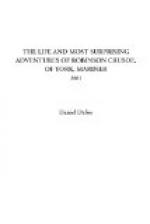Thus having fed him sufficiently with boiled meat and broth at that time, the next day I was resolved to feast him with a roasted piece of the kid. And having no spit to fasten it, nor jack to turn it, I made use of that common artifice which many of the common people of England have, that is to let two poles upon each side of the fire, and one cross on top, hanging the meat thereon with a string, and so turning round continually, roast it, in the same manner as we read bloody tyrants of old cruelly roasted the holy martyrs. This practice caused great admiration in my man Friday, being quite another way than that to which the savages were accustomed. But when he came to taste the sweetness and tenderness of the flesh, he expressed his entire satisfaction above a thousand different ways. And as I could not but understand his meaning, you may be sure I was as wonderfully pleased, especially when he made it also very plain to me, that he would never, while he lived eat man’s flesh more.
It was now high time I should set my servant to work; so next day I set him to beat out some corn, and sat it in the same manner as I had done before. And really the fellow was very quick and handy in the execution of any thing I ordered him to go about. I made him understand that it was to make bread for us to eat, and afterwards let him see me make it. In short, he did every thing as I ordered him, and in a little time as well as I could perform it myself.
But now considering that I had two mouths to feed instead of one, it was necessary that I must provide more ground for my harvest, and plant a larger quantity of corn than I commonly used to do; upon which I marked out a larger piece of land, fencing it in, in the same manner as I had done before; in the execution of which I must give Friday this good word; that no man could work, more hardy or with better will than he did: and when I made him sensible that it was for bread to serve him as well as me, he then very passionately made me understand that he thought I had much more labour on his account, than I had for myself; and that no pains or diligence should be wanting in him, if I would but direct him in those works wherein he might proceed.




